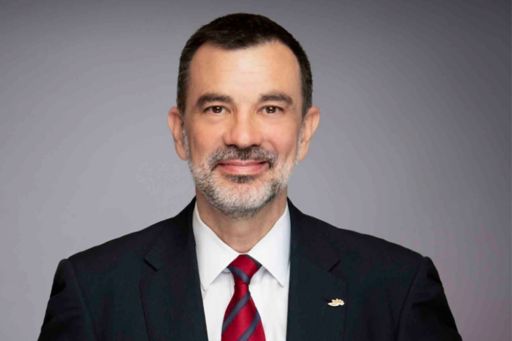What do banks look like today, in 2030?
Above all, banking is open and embedded — it is everywhere and anywhere in the digital space, including in the metaverse where we’re now seeing so many events, conventions and games. We used to talk about the distinction between banks and fintechs, but we are all fintechs now. We have almost no physical branches now, but we’re more present than ever in people’s lives. For example, our bank is inside most digital retailers and ecosystems, co-creating products with them for consumers; and we’re in the metaverse, working with our small and medium-sized enterprise customers.
So, the digital has replaced the physical?
Yes, in every way. Digital currency today is standard — not the cryptocurrency that people once got so excited about, because that was just too volatile. Instead, we have publicly-created digital currencies that work for people living and transacting in digital spaces. Similarly, blockchain is the standard for business-to-business transactions. In some ways, we’ve mirrored the physical world, in that there is still touch. For example, we make payments by swiping on our screens — you just move a finger from one place to another to move your money, just like you used to move notes and coins.
Is this new world safe for customers?
It’s a big target for cyber criminals and those bad actors are more organized and resourceful than ever. But what’s really encouraging is the way all the banks are working together, with the police and other regulatory authorities, to combat cybercrime — and to do so across borders. Today, we’ve got to the stage where we can say we’re on top of cybercrime. Working together, and leveraging technologies such as artificial intelligence, we can beat the criminals. We’re taking the same approach with crimes such as money laundering and the financing of terrorism — and even with tax evasion.
Information sharing has been so positive. It’s really helping us to manage every type of risk. The way in which specialist agencies are aggregating information to help us assess credit default risk, for example, is transformative.
“In 2030, we have publicly-created digital currencies that work for people living and transacting in digital spaces. Similarly, blockchain is the standard for business-to-business transactions.”
Has every bank made these leaps?
We’ve seen real consolidation. There is just not the space for the 20,000 banks we used to have around the world, not to mention all those fintechs. So what we see now is that fintechs are embedded within the surviving banks, which have effectively become large technology companies — and there are far fewer of them. You need scale to make the investments in technology that have been required in recent years. One interesting development is that predictions of the demise of large international banks proved to be wrong. In the past few decades, we saw many large banks pulling back from overseas markets in order to concentrate on their core territories. But that was because banks effectively had to start again in each new market and getting to scale was difficult; today, by contrast, with modern technology stacks, you can move and scale up anywhere. These stacks are architected in a completely different way, with open API connections and micro-services — that structure is standardized and applicable everywhere.
What about new entrants?
There is always competition in banking, particularly as new products and services evolve. But I’ve heard so many times that incumbent banks will be replaced and it just hasn’t happened — because there’s not enough value for those who would replace them. Banking is a regulated business — and that means returns are regulated too. We’ve seen the big technology companies cherry pick parts of the banking business, but they don’t want to be in regulated banking because the capital requirements are too large and the returns are too low.
Is BigTech’s data giving them a competitive edge in those areas of banking that they are targeting?
Not any longer, because the banks actually now have better, deeper data. The truth about BigTech firms is that they’ve always had massive amounts of data, but not very deep at the client level. The difference in banking is that I know how much money my clients have, how they make their money, where and when they spend it, and so much more — and I’ve known that for years. The challenge for banks has been to put that depth of data to work. We’ve learned to get much better at organizing and managing all that data, which is where BigTech used to outperform us. Now we’ve done that, and we can compete, because our data is deeper and stronger.
As Group Head of Mashreq’s Retail Banking Group (RBG), Fernando Morillo ensures that every Mashreq retail customer receives a superior banking experience. He is responsible for delivering profitable revenue growth and managing and executing the retail strategy across Mashreq’s personal banking, Mashreq Gold, private banking, SMEs, Islamic and Emirati segments, in addition to the bank’s digital propositions — Mashreq Neo and NEOBiz.
Fernando brings almost 30 years of financial services experience to his new role at Mashreq. Most recently, he served as the Managing Director & Global Head of Retail Products and Segments for Standard Chartered Bank in Singapore.
About the voices
The financial services sector is going through transformative change. To predict what the future of the sector could look like, we interviewed leaders from across financial services and beyond – insiders, outsiders and challengers – asked them to place themselves in 2030 and describe the financial landscape they think could emerge in the years ahead.
The ’Voices’ in this report cover many facets of financial services and beyond — from incumbents to challengers, BigTech to fintechs, policy makers to legal experts. Taken together, they create a valuable chorus of insight and expertise.
A summary of their insights can be found below.
Many of the views expressed in this report may be aspirational and personal and may not necessarily represent those of the Voices’ organizations or that of KPMG.
Contact us

Fernando Morillo
Senior Executive Vice President, Group Head of Retail Banking, Mashreq
Connect with us
- Find office locations kpmg.findOfficeLocations
- kpmg.emailUs
- Social media @ KPMG kpmg.socialMedia
Stay up to date with what matters to you
Gain access to personalized content based on your interests by signing up today


